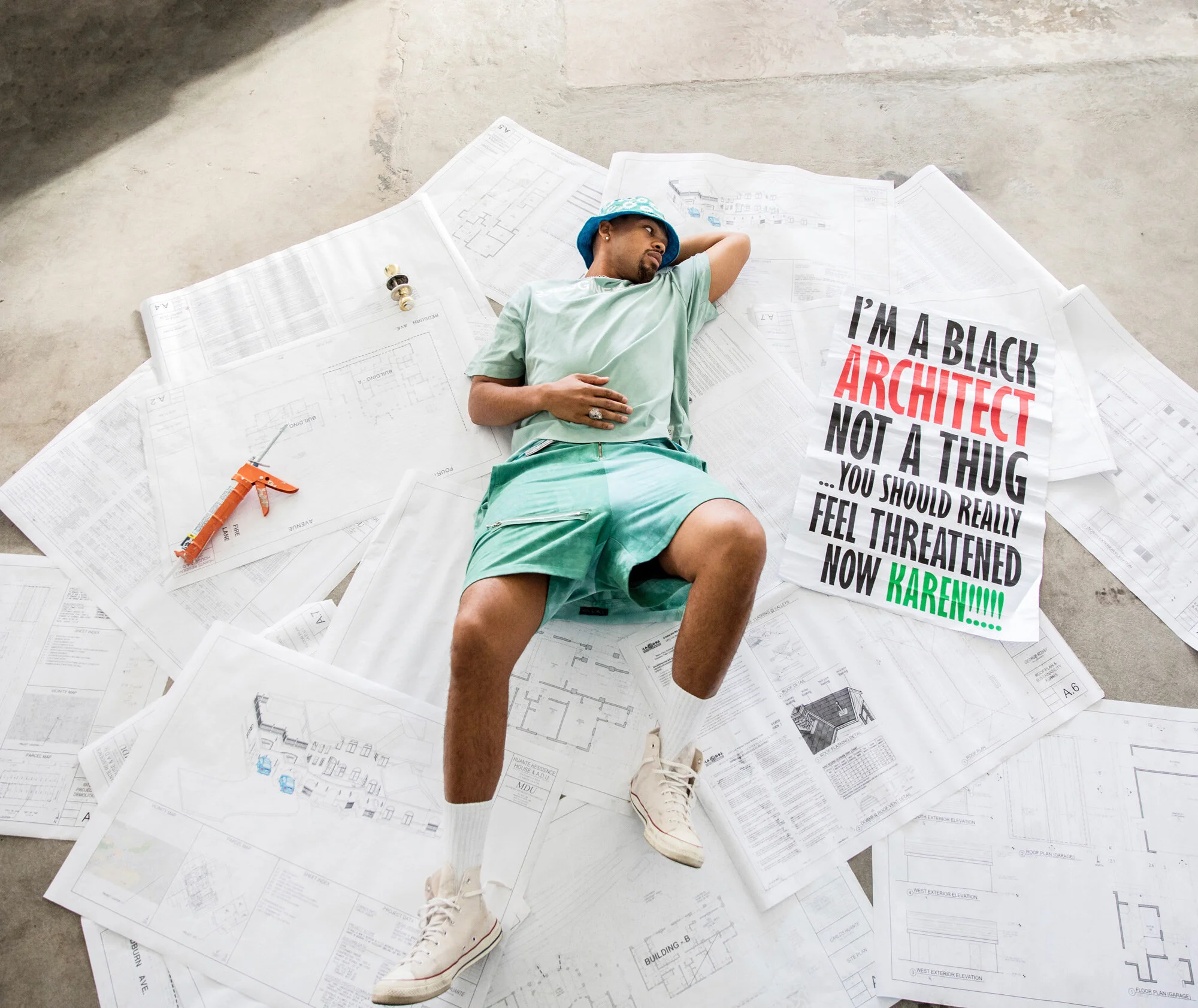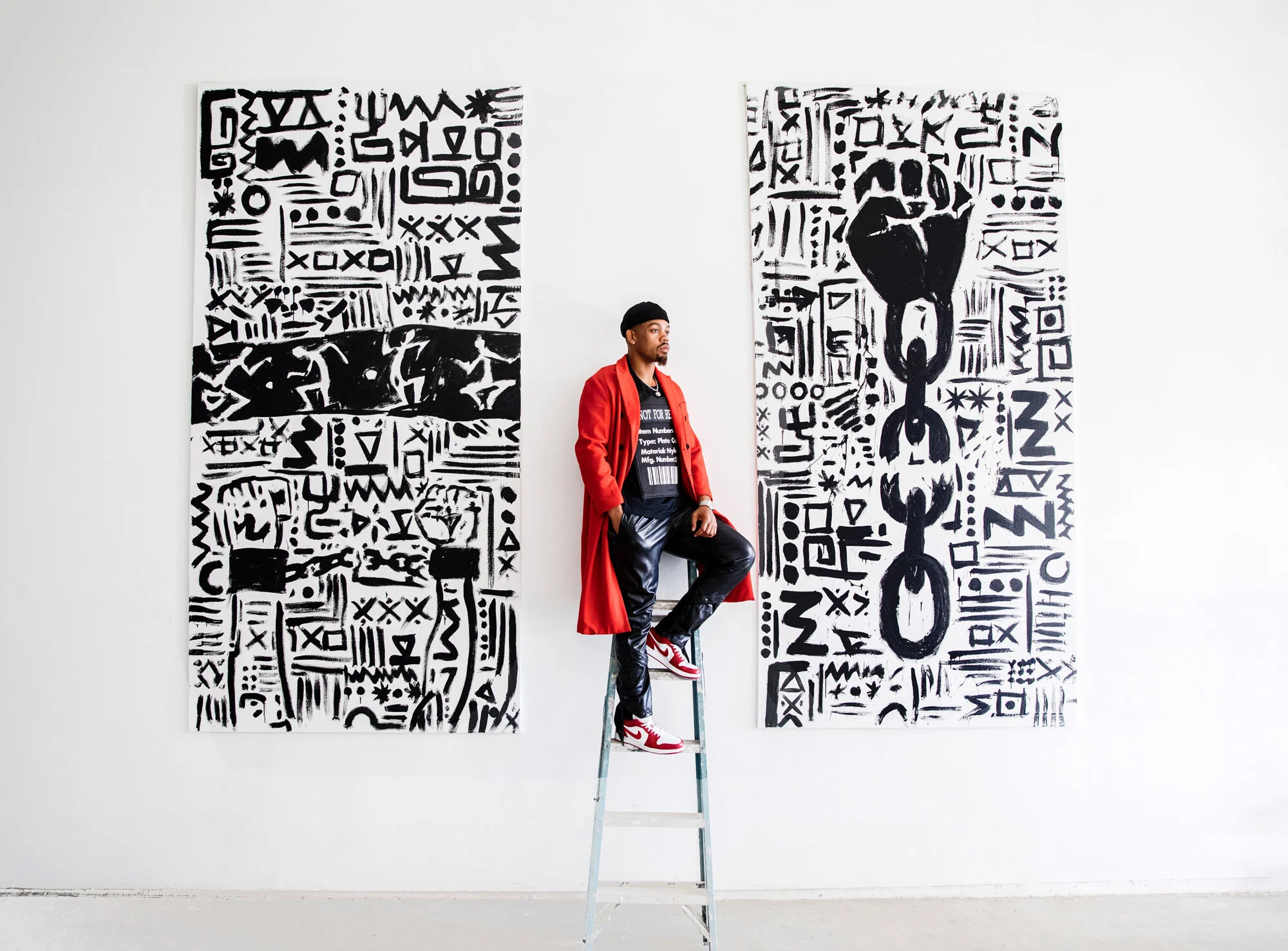
“I noticed a void in designing spaces that could benefit from my help and expertise; not only do people need architects, but they also need great designers who understand space.”
Venturing on your own and accumulating a great network can take time. Some may have that drive and tenacity to be innovative with ideas and their perspective on life. Don't get us wrong, being creative can take on so many definitions. It can revolve around finding solutions, tackling original ideas, or just an authentic way of seeing things. It can also be a very concrete, technological advancement or an intangible concept. There is no right or wrong when it comes to innovation, just different points of view.
During the most hectic year, we had an exceptional opportunity to sit and speak with Architect and Production Designer Davon Johnson. We've experienced Davon in his element and witnessed how he thrives in his work environment. He has created some fantastic set designs for some notable celebrities and companies like Coachella, Snoop Dogg, and Pepsi...the list goes on. In our chat, he shared his love for architecture, his influences, how his family's name cemented his passion for being creative in the architectural field.



What prompted you to get into the field of design and architecture?
I've always been an artist, ever since I could pick up a pencil. Growing up, my family kept me involved in various activities that unintentionally honed my creative genius. At a very early age, I would dedicate time to projects like painting homes with my grandfather and creating unique art projects with my mother. My village embraced my skills and, more importantly, formed the foundation of my multidimensional brain.
I would say my life as an artist officially started when I got to high school. During my freshman year at Loyola, I decided to take Art as an elective. I enrolled myself in a sketching class with Mrs. Turner. This was one of the best decisions I ever made. Mrs. Turner provided structure and technique to my talents; she became my mentor and muse. When I got to my senior year, she asked me, "What do you plan on studying in college?" Initially, I wanted to be a graphic designer or a storyboard artist for movies. She ended our conversation by asking, "What about architecture?" Once she said that, the light bulb lit up over my head like an old cartoon. At that moment, I realized that I've always admired architecture but never considered pursuing it professionally. Unfortunately during that time, within the black culture, architecture was rarely prompted as something people should take on as a trade. When you think about it, everything around us is architecture. So many buildings, masses, and volumes make up the landscape in which we inhabit. We don't get taught the details and its processes within our community. So, I researched after my conversation with Mrs. Turner and decided that I wanted to do this. Little did I know, being an architect was divine. Here is where it gets deep: in 2007, I was accepted into Hampton University's Masters of Architecture program. During my senior year, the faculty held a lecture where historians spoke about architecture and black architecture within the United States.
Now, before I go any further, let me brief you with a quick back story. My great grandfather, Joseph Lacour, passed two months before the historian came to my school. During that time, my cousin told us about our family history at my great grandfather's funeral. I learned where we come from within Louisiana and around the states, our origins, and our family's surnames. Two of the names mentioned were the Metoyers and LaCour's. Now, let's flash forward to the historian's lecture. When she started telling us about the history of black architecture within the U.S., she mentioned that one of the first black architectural families in America were the Metoyers from Louisiana. I shouted with excitement from the back of the auditorium, "HOLY SHIT, THAT'S MY FAMILY!" My first time catching the holy ghost, lol. I thought it was just a bug or something that I was always interested in, something I just naturally had a talent for, but it was my calling to be an architect. I believe that says so much about the history that is stripped from our culture. Often, we think we may have these talents or these little itches of different things we like to do, but it's actually what we are destined to be doing.
“I thought it was just a bug or something that I was always interested in, something I just naturally had a talent for, but it was my calling to be an architect.”
What an inspirational story leads to my next question. Being that you were motivated by your art teacher to get into architecture, learning what you now know about your family's history in college, and landing a job at one of the top architectural firms, what led you to branch off and start your own?
I always knew I wanted to be a design leader, even when I was at the company. I took the initiative to make sure I was vocal about my thoughts and attempted to create my own lane within the company despite being a fortune500 architectural firm. Knowing the history of my family's name reminded me that deep down inside me was a more significant potential; I knew I had a calling. I had a great time at the firm, but I felt like all of my creative juices and geniuses were being put in a vault, leading me to want to do my own thing. Outside of the company and within my personal life, I felt confident. I possessed the talents to venture out and create something more prominent than our office building's confinements. Considering my network, I took the knowledge I gained from my job and saw what it took to run a business. I had a lot of support and people willing to give me opportunities and plug me into different places. I noticed a void in designing spaces that could benefit from my help and expertise; not only do people need architects, but they also need great designers who understand space.

“ Growing up, my family kept me involved in various activities that unintentionally honed my creative genius.”
You've worked on many notable projects, from the Grammy's, BET Awards, and Pepsi. When designing sets, how do you prepare for these projects, what ignites your creativity?
I get inspired by everything, almost like Frank Lloyd Wright when he used to ball up the paper and create buildings. I can see beauty and foundation in literally everything! When I am asked to work on projects from scratch, I pull inspiration from the clients. Even if it's a simple stick figure drawing, I build upon that. Traveling and being around my friends also helps me understand how I should work on projects handed to me.
What would be your advice to another aspiring architect, set designer interested in starting their own business?
My best advice is to tap in and know who you are. Take time weighing your options out. I didn't just leave my job; I made sure that I at least had opportunities somewhat lined up. You really don't know until you harness all your energy into your mission. I've learned that, no matter what it is, when you put your all into it and say, "I want that," then it usually happens.


